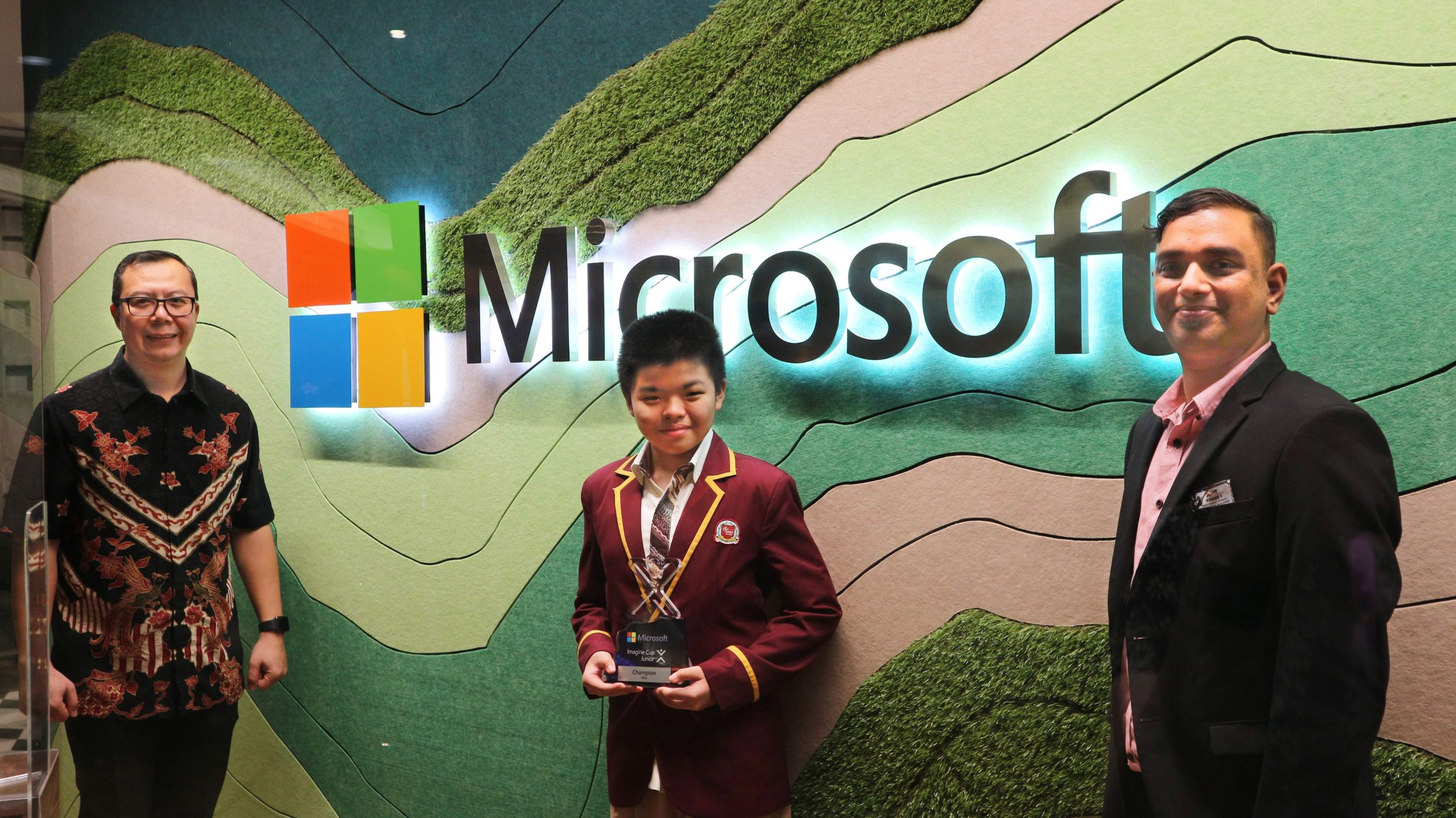Left to right: Microsoft Indonesia Chief of Operations & Director of Marketing Lucky Gani, Imagine Cup Junior winner from Indonesia Evan Felix Santoso, BINUS SCHOOL Simprug Science Teacher Nikhil Loyola Dsouza
Read the Indonesian version here.
Jakarta, 24 August 2022 – An Indonesian 8th grader from BINUS SCHOOL Simprug, Evan Felix Santoso, successfully make the nation proud by winning the global competition Imagine Cup Junior AI for Good Challenge 2022 organized by Microsoft. In this third edition, Imagine Cup Junior 2022 was joined by thousands of teenagers aged 13-18 years from various parts of the world who came up with new ideas for utilizing artificial intelligence (AI) technology in responding to environmental and social challenges faced by the modern world. Evan’s victory also made him the only Indonesian among all 10 winners of the competition.
To answer the challenge from Microsoft, Evan presented an idea called Sea Waste Scavengers which proposes using AI technology to operate hydro-powered and solar-powered ships that can track, find, and retrieve plastic waste in the ocean before shipping it to a recycling facility. This idea serves as an answer to the plastic waste pollution in Indonesian and global waters that continues to threaten the survival of marine life.
“The inspiration for the Sea Waste Scavengers came from the MAS400 or Mayflower Autonomous Ship 400, a fully automated renewable energy powered ship created to celebrate the 400th anniversary of the original Mayflower that brought the first pilgrims to America. Therefore, the ship was designed to sail from England to America, while studying marine life along the way. This is surely a new experience for me who is just learning about AI technology, and I am very happy that I can win. In the future, I hope that by cleaning up marine pollution, we can also save the life of marine plants and animals, so that our oceans will not only be cleaner, but also full of life and more beautiful,” said Evan Felix Santoso.
The solutions offered through the Sea Waste Scavengers concept are becoming increasingly relevant amid plastic pollution in Indonesian waters. According to World Bank’s data, around 365.5 kton of plastic waste from land ends up in Indonesian seas, of which two-thirds come from the Java and Sumatra Islands*. To address this, the Government of Indonesia has targeted an increase in ocean plastic management by 70% in 2025**.
“As the teacher who assisted in the creation of the Sea Waste Scavengers idea that Evan developed, I believe he has put his heart, mind, and soul into this project. He is developing the concept that not only solves an uprising challenge in the 21st century but is also applicable to many countries worldwide. I send thanks to the many mentors which have helped us throughout the way, as this has been the first time for us to have entered the competition. I hope more ideas will be developed by 21st century thinkers for a better world,” said BINUS SCHOOL Simprug Science teacher Nikhil Loyola Dsouza.
“Sea Waste Scavengers, an idea created by BINUS SCHOOL Simprug student, has put into action his passionate spirit to contribute to the world around him and, at the same time, continue to build and serve Indonesia. We congratulate our student Evan Felix Santoso and our teacher Mr. Nikhil Dsouza, who have fostered and empowered our next generation of impactful change-makers to come closer to putting into action the noble aspirations of our future generation. We at BINUS School hope to engage more students and teachers in all of our schools to continue with future impactful change-making projects such as this one,” said BINUS SCHOOL Simprug Principal Isaac Koh.
The Imagine Cup Junior competition is part of Microsoft’s commitment to developing AI technologies that empower organizations around the world to solve global challenges related to the environment, humanitarian, accessibility, health, and cultural heritage. This commitment is encapsulated in the Microsoft AI for Good initiative that enables every AI enthusiast to accelerate brilliant ideas into real, impactful, and scalable efforts. Some of the projects from this initiative include preventing species extinction through AI for Earth, increasing accessibility for people with disabilities through AI for Accessibility, and increasing the capability of first responders in disaster areas with AI for Humanitarian Action.
Besides Sea Waste Scavengers, there were nine other ideas from various countries that won the competition, such as the HACKRR from the Philippines which proposed a browser extension to combat hoaxes and fake news, and an idea called Earthatarian from the United Kingdom which aims to reduce food waste by predicting the actual expiration date of food while monitoring food consumption.
“It is our commitment at Microsoft to empower every person and every organization to positively contribute to the earth. This includes empowering students, regardless of their age and education level, to do the same. With the rapid development of digital talent and the country’s technology industry, Evan’s victory from BINUS SCHOOL Simprug further proves how Indonesian children are full of out-of-the-box ideas that can help us utilize technology for a better life. Hopefully, this can be an inspiration for all of us to work together to empower Indonesia,” said Obert Hoseanto, Education Programs & Skills Lead, Microsoft Indonesia.
Learn more about the stories of nine other Imagine Cup Junior 2022 winners here.
###
*World Bank, 2021. Plastic Waste Discharges from Rivers and Coastlines in Indonesia.
**Coordinating Ministry for Maritime Affairs and Investment of the Republic of Indonesia, 2022. Indonesia Targets to Reduce Plastic Waste by 70 Percent by 2025.


